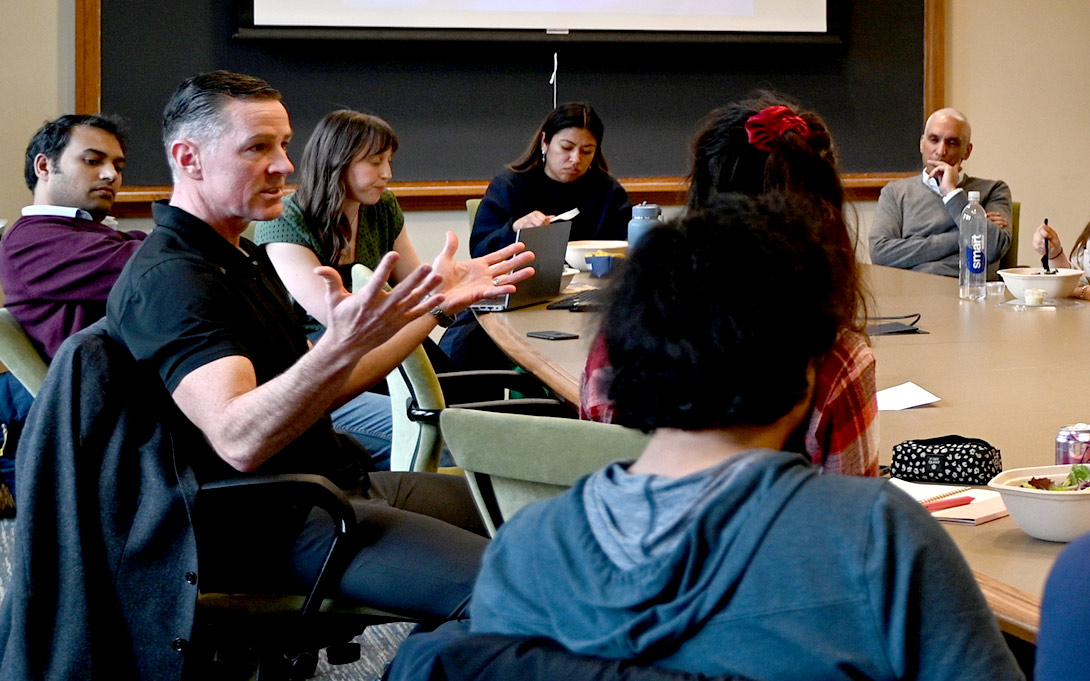
Matt Maasdam, a former Navy SEAL and former military aide to President Obama, joined Javed Ali and 15 students for a lunchtime event, “Leadership through Teamwork.” In a lunch-time chat hosted by the Ford School Leadership Initiative, Maasdam shared his insights on leading high-performing teams and offered five points that students can apply in any workplace.
1. Be great at your job
Maasdam emphasized mastering everything related to your job, including the basics. Drawing from his experience as a SEAL, he highlighted how a driver of a humvee needs to know not only how to drive fast and in rough terrain but also how to change a tire quickly. Someone has to know all these aspects of a job to be successful. Maasdam advised those who want to be good leaders to invest time and energy to become an expert in their field.
2. Empower your team
From his time in the SEALS to the White House, Maasdam says he never viewed himself as higher than others on the team—even when in positions of authority on the team. He emphasized that being a leader does not mean a person should take over other people’s roles in a team. Instead, Maasdam recommended distributing authority to everyone on the team. “Everyone in a team is an expert at something and that should be respected,” he said. Despite distributing authority throughout the team, he clarified that a leader is responsible for mistakes made by a team. “I won’t take the credit, but I will take the fall,” Maasdam stated. When team members feel trusted and empowered, they are more likely to perform well at their job, be satisfied with their work, and be committed to the organization.
3. Be a great communicator
Maasdam explained that at the root of great communication is to speak simply and clearly and repeat your thoughts. To emphasize his point, he shared a story where a civilian plane that took off from JFK airport sent a transponder code that they were being hijacked. At the time, Maasdam was the Military Aide to President Obama, responsible for making the president aware of impending national security crises. Upon being notified of the situation, he requested that the lead investigator of the situation let him know the important information (e.g. how much fuel did the plane have, how many people were aboard the aircraft, etc.) within 2 minutes. The investigator was able to find all the specific information Maasdam wanted quickly, partly due to the fact that Maasdam clearly articulated what information he needed. As he waited to hear back, Maasdam decided to delay telling Obama about the potential hijacking. This was ultimately a good decision as the entire problem was a miscommunication. The aircraft’s radio has malfunctioned and its pilot’s used the wrong transponder code when relaying that information. Maasdam kept this misunderstanding from becoming a national emergency because of good communication.
4. Establish strong relationships
Maasdam said prioritizing relationship building within the Navy SEALS community and the White House helped him earn the role as the Military Aide to President Obama. While working at the White House, Maasdam joined the President for his workout sessions so they could get to know each other. He explained that this intentionality cultivated high levels of trust between them, which was critical during intense situations. Maasdam encouraged students to be intentional about building relationships because, “you don’t want the first time you talk to your boss to be when you’re delivering bad news or need a crucial decision.”
5. Policy is complex. Prioritize your goals.
Success doesn’t always mean getting your entire policy agenda through. Drawing on his experience at the National Counterterrorism Center, Maasdam highlighted the complexities of policymaking and how it requires many different individuals and agencies to work together and compromise to reach a final solution everyone can agree on. Policy work requires negotiation. To be successful, Maasdam urged students to keep the most important goals in mind and understand what recommendations can be modified or dropped.
Learn more about Leadership Initiative workshops and other extracurricular programming.
Matt Maasdam is a former Navy SEAL who fought Al-Qaeda in Afghanistan and guarded the Iraqi Vice President in Baghdad. After combat, Matt led SEAL Training as the head instructor, leading 1,000 students through 'Hellweek'. Matt represented the U.S. Special Operations Command at the National Counterterrorism Center, focusing on strategic planning against Al-Qaeda. He was selected to carry the ‘Nuclear Football’ for the President of the United States in 2010. Matt also served as an Under Armor executive and founded several companies. Matt received his BA from the University of Michigan (1997) and his MPA from Harvard Kennedy School (2008).